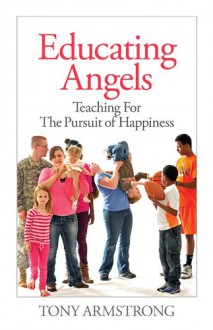
In this refreshing inquiry into the true purpose of education, Tony Armstrong turns away from the current focus on subjects like STEM (science, technology, engineering and mathematics) and standardized tests, and offers an intriguing alternative. With Educating Angels: Teaching for the Pursuit of Happiness, Armstrong calls for a paradigm shift away from education that treats students as a means to an economic end, toward practices that support the goal of achieving each student’s happiness.
Presenting his own thoughts, as well as ideas from an impressive variety of experts, Armstrong makes a strong case that encouraging happiness as the core of education would not only result in more satisfied students, but also a more engaged citizenry.
Armstrong opens with angel imagery—“My students might be angels … the light of angelic soul shines through their eyes … I see the worth of angels in them”—that suggests the book may have an overriding spiritual tenor. It doesn’t. While the author is indeed a visionary with strong beliefs about the sanctity of each person’s experience, he is also a college professor and a lifelong student of philosophy, psychology, and logic.
Thus Educating Angels has an academic, intellectual tone. In clear, sophisticated language, Armstrong asks the reader not to follow his ideas blindly, but to examine the evidence that leads him to conclude: “If happiness is the common end of all human striving, and public education is the main means for governments to empower each citizen to pursue his own ends, it follows that empowering the pursuit of happiness is the main purpose of public education.”
In well-organized and comprehensively referenced chapters, the author delves into topics such as the purpose of education, the nature of happiness, and the sources of happiness. These are not mere musings; Armstrong uses data from his own research, as well as ideas from philosophers like David Hume, Immanuel Kant, and John Locke and contemporary psychology writers like Mihaly Csikszentmihalyi and Martin Seligman to support the need for a new type of curriculum. For instance, Csikszentmihalyi’s work on “flow” indicates that students engaged in their areas of strength will work harder and longer, accomplish more, and be more satisfied than those forced to pursue a distributed course of study across a variety of subjects.
As rigorous as Armstrong’s academic inquiry is, his theory might come to nothing without a consideration of the methods by which schools can teach happiness. Fittingly, the longest chapter in the book offers myriad practical suggestions for developing a new “happiness pedagogy.” A small sampling of methods includes: teaching mindfulness, encouraging a wide range of creative expression, practicing gratitude and forgiveness, and encouraging students to reflect on their own unique gifts. Armstrong breaks this down into grade levels, sowing the seeds of a comprehensive curriculum to be implemented from kindergarten to college. He also mentions inspiring programs already in place, such as Inner Kids, MindUP of the Hawn Foundation, and the Mindfulness in Education Network.
“If education can contribute more to our children’s happiness, it ought to,” concludes Armstrong. Educating Angels persuasively argues that this isn’t an impossibly lofty goal, but an entirely achievable one. Educators at all levels will benefit from considering Armstrong’s ideas and their possible implementation in the classroom.
Sheila M. Trask for ForeWord Reviews
November 26, 2013

 In contrast with ‘fast’ education that creates exam-oriented children, many alternative schools are experimenting with a more holistic approach that uses a mix of tools that develop children’s physical, emotional, and intellectual capacities.
In contrast with ‘fast’ education that creates exam-oriented children, many alternative schools are experimenting with a more holistic approach that uses a mix of tools that develop children’s physical, emotional, and intellectual capacities.
 Log in with Facebook
Log in with Facebook 







